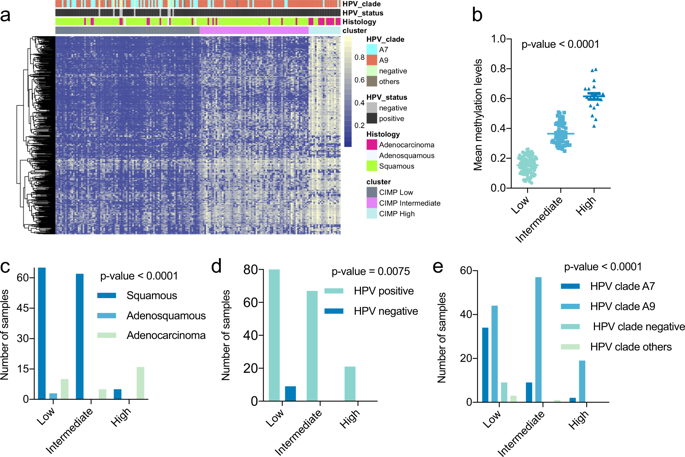当前位置:
X-MOL 学术
›
Signal Transduct. Target Ther.
›
论文详情
Our official English website, www.x-mol.net, welcomes your
feedback! (Note: you will need to create a separate account there.)
Integrative analysis of DNA methylation and gene expression identified cervical cancer-specific diagnostic biomarkers.
Signal Transduction and Targeted Therapy ( IF 40.8 ) Pub Date : 2019-12-13 , DOI: 10.1038/s41392-019-0081-6 Wanxue Xu 1 , Mengyao Xu 1 , Longlong Wang 1, 2 , Wei Zhou 1 , Rong Xiang 1 , Yi Shi 1, 2 , Yunshan Zhang 3 , Yongjun Piao 1, 2
Signal Transduction and Targeted Therapy ( IF 40.8 ) Pub Date : 2019-12-13 , DOI: 10.1038/s41392-019-0081-6 Wanxue Xu 1 , Mengyao Xu 1 , Longlong Wang 1, 2 , Wei Zhou 1 , Rong Xiang 1 , Yi Shi 1, 2 , Yunshan Zhang 3 , Yongjun Piao 1, 2
Affiliation

|
Cervical cancer is the leading cause of death among women with cancer worldwide. Here, we performed an integrative analysis of Illumina HumanMethylation450K and RNA-seq data from TCGA to identify cervical cancer-specific DNA methylation markers. We first identified differentially methylated and expressed genes and examined the correlation between DNA methylation and gene expression. The DNA methylation profiles of 12 types of cancers, including cervical cancer, were used to generate a candidate set, and machine-learning techniques were adopted to define the final cervical cancer-specific markers in the candidate set. Then, we assessed the protein levels of marker genes by immunohistochemistry by using tissue arrays containing 93 human cervical squamous cell carcinoma samples and cancer-adjacent normal tissues. Promoter methylation was negatively correlated with the local regulation of gene expression. In the distant regulation of gene expression, the methylation of hypermethylated genes was more likely to be negatively correlated with gene expression, while the methylation of hypomethylated genes was more likely to be positively correlated with gene expression. Moreover, we identified four cervical cancer-specific methylation markers, cg07211381 (RAB3C), cg12205729 (GABRA2), cg20708961 (ZNF257), and cg26490054 (SLC5A8), with 96.2% sensitivity and 95.2% specificity by using the tenfold cross-validation of TCGA data. The four markers could distinguish tumors from normal tissues with a 94.2, 100, 100, and 100% AUC in four independent validation sets from the GEO database. Overall, our study demonstrates the potential use of methylation markers in cervical cancer diagnosis and may boost the development of new epigenetic therapies.
中文翻译:

DNA 甲基化和基因表达的综合分析确定了宫颈癌特异性诊断生物标志物。
宫颈癌是全世界癌症女性死亡的主要原因。在这里,我们对 Illumina HumanMmethylation450K 和来自 TCGA 的 RNA-seq 数据进行了综合分析,以确定宫颈癌特异性 DNA 甲基化标记。我们首先鉴定了差异甲基化和表达的基因,并检查了 DNA 甲基化和基因表达之间的相关性。利用包括宫颈癌在内的12种癌症的DNA甲基化谱生成候选集,并采用机器学习技术在候选集中定义最终的宫颈癌特异性标记物。然后,我们使用包含 93 个人宫颈鳞状细胞癌样本和癌旁正常组织的组织阵列,通过免疫组织化学评估了标记基因的蛋白质水平。启动子甲基化与基因表达的局部调控呈负相关。在基因表达的远程调控中,高甲基化基因的甲基化更可能与基因表达呈负相关,而低甲基化基因的甲基化更可能与基因表达呈正相关。此外,通过TCGA的十倍交叉验证,我们鉴定了四种宫颈癌特异性甲基化标志物cg07211381 (RAB3C)、cg12205729 (GABRA2)、cg20708961 (ZNF257)和cg26490054 (SLC5A8),其敏感性为96.2%,特异性为95.2%数据。这四种标记物可以在 GEO 数据库的四个独立验证集中以 94.2、100、100 和 100% AUC 区分肿瘤和正常组织。总体而言,我们的研究证明了甲基化标记物在宫颈癌诊断中的潜在用途,并可能促进新表观遗传疗法的开发。
更新日期:2019-12-13
中文翻译:

DNA 甲基化和基因表达的综合分析确定了宫颈癌特异性诊断生物标志物。
宫颈癌是全世界癌症女性死亡的主要原因。在这里,我们对 Illumina HumanMmethylation450K 和来自 TCGA 的 RNA-seq 数据进行了综合分析,以确定宫颈癌特异性 DNA 甲基化标记。我们首先鉴定了差异甲基化和表达的基因,并检查了 DNA 甲基化和基因表达之间的相关性。利用包括宫颈癌在内的12种癌症的DNA甲基化谱生成候选集,并采用机器学习技术在候选集中定义最终的宫颈癌特异性标记物。然后,我们使用包含 93 个人宫颈鳞状细胞癌样本和癌旁正常组织的组织阵列,通过免疫组织化学评估了标记基因的蛋白质水平。启动子甲基化与基因表达的局部调控呈负相关。在基因表达的远程调控中,高甲基化基因的甲基化更可能与基因表达呈负相关,而低甲基化基因的甲基化更可能与基因表达呈正相关。此外,通过TCGA的十倍交叉验证,我们鉴定了四种宫颈癌特异性甲基化标志物cg07211381 (RAB3C)、cg12205729 (GABRA2)、cg20708961 (ZNF257)和cg26490054 (SLC5A8),其敏感性为96.2%,特异性为95.2%数据。这四种标记物可以在 GEO 数据库的四个独立验证集中以 94.2、100、100 和 100% AUC 区分肿瘤和正常组织。总体而言,我们的研究证明了甲基化标记物在宫颈癌诊断中的潜在用途,并可能促进新表观遗传疗法的开发。











































 京公网安备 11010802027423号
京公网安备 11010802027423号